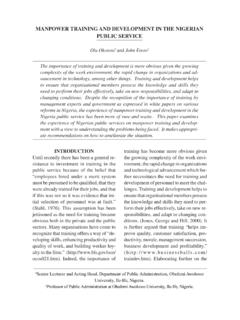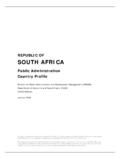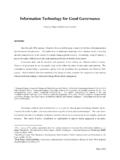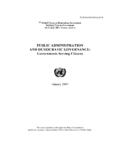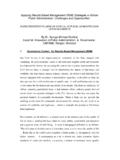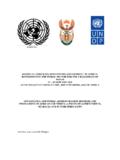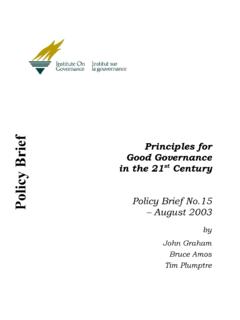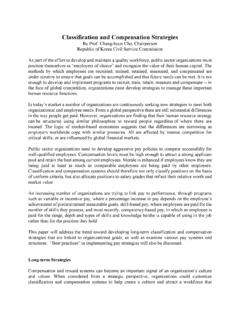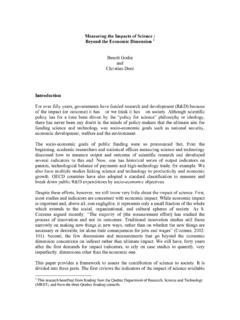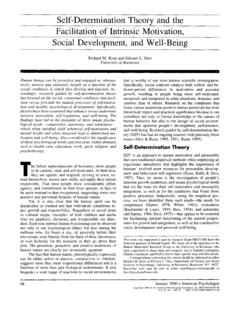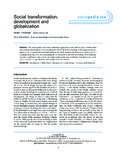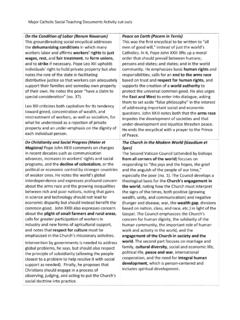Transcription of Culture and Education in the Development of Africa
1 1 Culture AND Education IN THE Development OF Africa By ISAAC N MAZONDE EXECUTIVE SUMMARY Today, Africa remains the world s poorest continent. There could be several reasons for this but one of the key ones is that Education has not been relevant to the needs of the society. Substantial resources have been expended to boost Education in Africa , even though such resources may not have been adequate. The basic problem is that educational structures were formulated by colonialists who had a cultural background different to that obtaining among Africans.
2 Decades of self rule and independence have not succeeded in empowering Africans through enabling them determine their educational framework. In part, this difficulty is a result of the continued social and economic ties between African countries and their former colonising powers. Although Africa is politically independent, it remains technologically and economically dependent on countries that colonised it. Current educational structures are meant mainly to foster this bond, rather than reduce it. Reforms in African Education were conceived and implemented within the framework of this relationship, hence they did not go far enough to develop and foster African Culture .
3 This paper is divided into sections. Each section discusses a specific aspect of Education . The material is drawn from across Africa , and many countries are used as cases, thus giving the paper a comparative perspective. Section I is a historical presentation of the evolution of Education across Africa . It highlights key areas of focus in traditional Education before the advent of Europeans. At this point in time, Education was structured by the people and it was relevant to the needs of the society that prevailed then. Such Education was based on the values and traditional systems of societies.
4 It was when Africa was colonised that modern or western Education was introduced. It undermined the traditional value system and created social classes that did not exist before its advent. Western values replaced traditional ones and in the process traditional African Education was relegated to the margins, being associated with rural people who lost their socio-economic power with the onset of western values. Post-colonial Education has contiuned the links with the west. The post colonial educational system has operated to strengthen such links. Section II focuses on primary Education .
5 The section highlights the problem of growing numbers of primary school children across sub-saharan Africa , showing the rates of growth and reflecting on the costs of providing Education for these children. The section explains some of the reasons why some African children will never receive formal schooling and then shoes costs associated with Education at the primary school level. The section proposes some alternatives to formal schooling. Section III addresses higher Education . This section brings into the discussion ideas of the World Bank, an organisation that funded higher Education in a number of African countries.
6 The Bank s arguments are tested for relevance to African situations and alternatives are suggested. Curriculum changes are suggested and the role of the government in the provision of higher Education is evaluated. Section IV touches on curriculum. It argues that African countries have Africanised their Education curricula quite slowly. Changes have occurred mainly in science subjects, such as mathematics. One might argue that such subjects have a small political economy dimension, hence the willingness of the west to make appropriate reforms in them.
7 The section considers the role of informal Education and that of vocational training, putting the informal sector in the perspective. Section V is on modeling African Education for Development . The section concentrates on the curricula for certain countries, essentially Zimbabwe, but also brings in experiences from Latin America. 2 Section VI brings to the fore problems associated with using a second language as the main language for learning. Cases used include French and English as the medium of instruction for African students. The problems are discussed under three sub-headings: pedagogical, supply of teachers and administrative difficulties.
8 The literature reveals the difficulties African pupils face in understanding the basic concepts when taught in a foreign language and also the shortage. Most importantly, the discussion shows how Culture comes up strongly to present a barrier for African students when they are forced to learn in a foreign language which is based on values and metaphors different from theirs. INTRODUCTION This paper sets out to discuss how Culture has influenced Education and also how Education has influenced Culture in Africa over time, from the pre-colonial through the colonial to the post-colonial period.
9 Due to paucity of more current or up to-date literature, the post colonial period will be considered only up to the mid 1990s. It is recognised, however, that the current period is characterised by the use of hi-tech in Education , tele- Education through TV and through video-conferencing, and the e-Learning initiative which is fast gaining a foothold in a number of African countries. Most of the discussion is on the colonial and the post colonial period. The discussion is in the form of analysing a very wide and comprehensive literature, even though one cannot claim that the literature is exhaustive.
10 The space allocated for the paper is a serious limiting factor as there is a lot to be said about this subject, such that it is far from enough to make a balanced presentation in less than 50 pages. The paper is divided into sections, each addressing a specific aspect of a broad theme of Culture and Education . Cultural aspects of Education do not stand out from the rest of the teaching or learning activities; there are often an integral part of it. Hence, the cultural dimensions of the discussion will be indirect most of the time. SECTION I: OVERVIEW OF Education IN Africa The Social Framework of Education in Africa This section sets out the social framework of Education in Africa through outlining the relationship between African societies and their educational systems with reference to both the pre-colonial and the colonial period.
